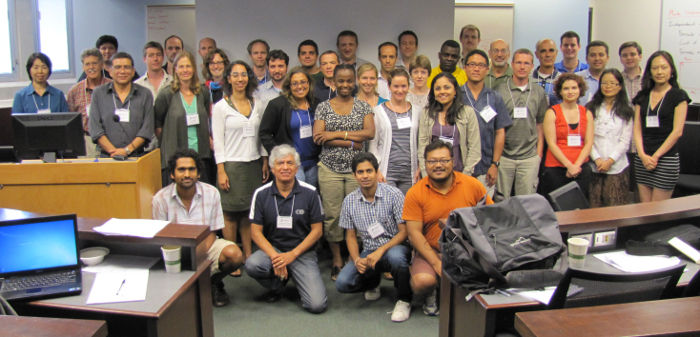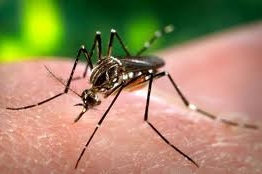| Description | Participants | Agenda | Summary | Products |
|---|
NIMBioS Investigative Workshop
Modeling Dengue Fever

Topic: Modeling dengue disease dynamics and control
Meeting dates: July 23-24, 2012
Location: NIMBioS at the University of Tennessee, Knoxville
Organizers:
Derek Cummings, Johns Hopkins Bloomberg School of Public Health
Zhilan Feng, Mathematics, Purdue Univ.
Jorge Velasco-Hernandez, Mathematics, UAM-Iztapalapa, Mexico
Michael Johansson, Centers for Disease Control and Prevention
More than one-third of the world's population lives in areas at risk for the transmission of dengue, a vector-transmitted disease that is one of the leading causes of death and illness in the tropics and subtropics. This workshop, to be held July 23,-24, 2012, will bring together public health officials as well as mathematicians, biologists and epidemiologists to identify important modeling issues and to establish possible new collaborations on modeling dengue disease dynamics and control.
Objectives:
- Promote an interdisciplinary approach to identify important issues in modeling Dengue transmission dynamics and control.
- Encourage the establishment of new collaborations for research on Dengue and other infectious diseases with non-human transmission components.
- Develop DENV models that incorporate important features such as vector dynamics and control, serotype interactions and immunity, and at the same time allow for model testing/validation.
 Summary Report.
The workshop included several short talks with focus on dengue virus (DENV) serotype interactions, vectors in DENV models, and data from the field. The talks were followed by plenary and small group discussions. In the plenary session some specific topics were identified for further discussion in four small groups. The topics of these groups include: (i) Dengue epidemiology in Asia and the Americas; (ii) Vector modeling; (iii) Coupling of immune system models to epidemiological models; and (iv) Statistical methods in data estimations. Each of the small groups reported their results to the whole group for further comments and discussion. Some of the groups are interested in continuing the identified dengue modeling projects, which will likely lead to follow-up working groups.
Summary Report.
The workshop included several short talks with focus on dengue virus (DENV) serotype interactions, vectors in DENV models, and data from the field. The talks were followed by plenary and small group discussions. In the plenary session some specific topics were identified for further discussion in four small groups. The topics of these groups include: (i) Dengue epidemiology in Asia and the Americas; (ii) Vector modeling; (iii) Coupling of immune system models to epidemiological models; and (iv) Statistical methods in data estimations. Each of the small groups reported their results to the whole group for further comments and discussion. Some of the groups are interested in continuing the identified dengue modeling projects, which will likely lead to follow-up working groups.
Products
Publications
Martinez-Vega RA, Danis-Lozano R, Velasco-Hernandez J, Diaz-Quijano FA, Gonzalez-Fernandez M, Santos R, Roman S, Argaez-Sosa J, Nakamura M, Ramos-Castaneda J. 2012. A prospective cohort study to evaluate peridomestic infection as a determinant of dengue transmission: Protocol. BMC Public Health, 12: 262. [Online]
NIMBioS Investigative Workshops focus on broad topics or a set of related topics, summarizing/synthesizing the state of the art and identifying future directions. Workshops have up to 35 participants. Organizers and key invited researchers make up half the participants; the remaining participants are filled through open application from the scientific community. Open applicants selected to attend are notified by NIMBioS within two weeks of the application deadline. Investigative Workshops have the potential for leading to one or more future Working Groups. Individuals with a strong interest in the topic, including post-docs and graduate students, are encouraged to apply. If needed, NIMBioS can provide support (travel, meals, lodging) for Workshop attendees, whether from a non-profit or for-profit organization.
A goal of NIMBioS is to enhance the cadre of researchers capable of interdisciplinary efforts across mathematics and biology. As part of this goal, NIMBioS is committed to promoting diversity in all its activities. Diversity is considered in all its aspects, social and scientific, including gender, ethnicity, scientific field, career stage, geography and type of home institution. Questions regarding diversity issues should be directed to diversity@nimbios.org. You can read more about our Diversity Plan on our NIMBioS Policies web page. The NIMBioS building is fully handicapped accessible.
NIMBioS
1122 Volunteer Blvd., Suite 106
University of Tennessee
Knoxville,
TN 37996-3410
PH: (865) 974-9334
FAX: (865) 974-9461
Contact NIMBioS


